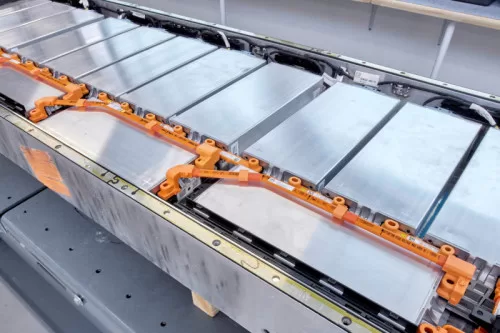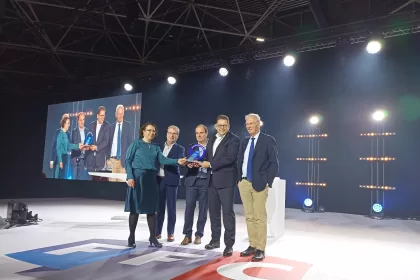- Using automated dismantling and testing processes to prepare commercial vehicle batteries for their subsequent use
- Goal: Economic remanufacturing
- REVAMP launched in February 2023, project duration: three years
With the ramp-up of electromobility, a strong increase in used batteries is to be expected in the future. After the first use of the energy storage units in the truck, bus or van (1st-life), there are basically various options for a second use: reuse in the vehicle (2nd-use), use in another application (2nd-life), e.g. as stationary buffer storage, or, as a last option, recycling to recover the valuable raw materials. Of these alternatives, the reprocessing of battery components for a second use represents an ecological and economic alternative.
This is the goal of the new research project REVAMP (Remanufacturing of variant battery modules with automated assembly and testing processes). The project is funded by the Federal Ministry of Economics and Climate Protection (BMWK) as part of the funding measure for “Research in Priority Funding for Battery Cell Production”. The aim is to increase the use rate for 2nd-use and 2nd-life batteries in Germany. The project is supervised by the project management organisation VDI/VDE-IT.
The basis for this process, called remanufacturing, which already exists for remanufactured engines or vehicle components, for example, is the condition assessment and automated dismantling of battery returns as the core aspect of REVAMP. On this basis, reprocessing, reassembly, testing and the reintroduction of the battery into the market are then researched.
The Machine Tool Laboratory (WZL) and the Institute for Power Electronics and Electrical Drives (ISEA) at RWTH Aachen University are involved in the REVAMP project. The Fraunhofer Institute for Production Technology (Fraunhofer IPT) is also part of the project. From industry, the following companies are involved: Bertrandt Technikum GmbH, Software AG, IBG Automation GmbH, BE-Power GmbH, Wacker Neuson Produktion GmbH & Co. KG, Weidemann GmbH and MAN Truck & Bus SE as consortium leader.
One challenge in connection with the remanufacturing of commercial vehicle batteries is that they have different ageing states when they come back for condition assessment. The fact that the shape, structure and manufacturer of the battery can be different is also one of the challenges of the REVAMP project. Therefore, it is very important that the entire remanufacturing system is designed flexibly and can react to the different states and battery characteristics.
The research project is being worked on in eleven work packages: Based on methodological and theoretical principles, procedures for condition assessment and 2nd-use and 2nd-life planning are being developed. Based on this, methods for the preparation of battery components at pack, module and cell level will be developed. In parallel, the flexible, automated disassembly and reassembly will be planned and the corresponding control components will be created.
In addition, a digital twin is being developed to map the entire battery life cycle. This digital twin will also be used for a life cycle assessment based on key figures in order to evaluate the decisions made for the subsequent use of the batteries and also to track the sustainability goals of remanufacturing. The results obtained will finally be validated in application-oriented tests and demonstrated in the eMobility technical centre at MAN in Nuremberg.














